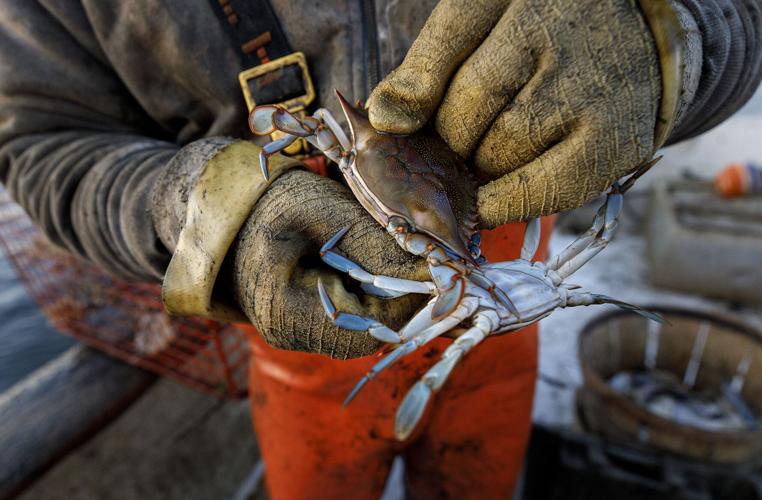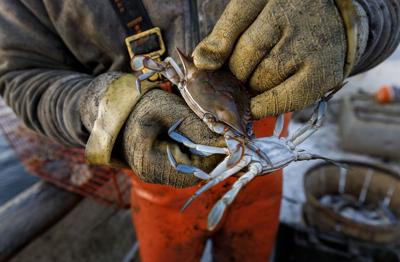COLUMBIA — State lawmakers and South Carolina crabbers are close to agreeing how best to protect the state's plummeting blue crab population, but one section of the proposal is standing in the way.
Crabbers oppose a rule that would allow the state Department of Natural Resources to close areas of the coast under certain conditions — a notion that has led to some tense exchanges with Isle of Palms Republican state Sen. Chip Campsen, the legislation’s lead sponsor.
Some crabbers don’t trust the department and simply oppose government intervention, while many others said they’re open to more oversight but only if the department fixes what they see as deficient data collection practices.
“That’s the only sticking point,” said Stacy Ford, the wife of a longtime crabber from Saint Helena Island who’s become an informal spokeswoman for a group of Lowcountry crabbers.
In the 1990s, SCDNR recorded about 6 million blue crabs caught annually. In recent years, the number has dipped under 3 million, while 2023 saw the lowest catch in 50 years.
Part of the problem is that climate change is altering the temperature and salinity of South Carolina's coastal waters, interfering with the crabs' spawning patterns.
But the other part of the decline, an SCDNR study published in January 2023 found, is that the blue crab fishery in South Carolina is almost completely unregulated, making the state unlike any other Atlantic state with a large crab fishery.
Currently, anyone with a saltwater fishing license and an equipment license can trap as many crabs as they want whenever they want in South Carolina. So out-of-state crabbers have flocked here, turning the state’s waters into a crab “Wild West,” local crabbers have told The Post and Courier.

Soft-shell blue crabs scurry around a bushel basket after being collected in dozens of David Richardson’s crab pots that dot the Cooper River on March 30, 2023.
A draft amendment to the bill being discussed in the Legislature would create a commercial blue crab license and cap licenses at 100 total for the entire coastal range.
The annual cost: $100 for a state resident and $500 for out of state.
Crabbers who have caught more than 4,000 pounds of blue crabs in any of the last three years would be eligible for a license that would allow them to deploy 200 blue crab traps or the average number of traps they used in the last three years. License holders would be able to transfer or sell their license.
Crabbers largely favor that aspect of the bill as it would effectively block some out-of-state boats from South Carolina waters and limit their competition. The other part of the legislation is more controversial. It would allow the wildlife agency to set criteria that could trigger the closure of an area to crabbing.
“The intent is not to have an 'on-off' switch, close everything down and shut everything down. That is the last resort,” Ben Dyar, the department’s director of fisheries management, told a Senate subcommittee March 13. “The idea is to have some type of volume knob.”
The goal of a fishery closure would be to allow the department to remove abandoned “ghost” traps and give crab populations time to rebound.
Crabbers were wary of handing the department that power.
"DNR is how you ruin the fishery," Charleston crabber Nathan Fleck said at a Senate subcommittee hearing in February. "That'll ruin a lot of us."
Others argued that the department's data collection on their catch and the overall population is lacking, and without improvements it won't be adequate to make serious decisions about closing the fishery.
"Under the circumstances, there's just too much lack of information," Stephen Preul, a crabber from Beaufort, told the Senate subcommittee March 13.
The department stands by its data collection efforts but is always looking to work with commercial crabbers to improve them, Erin Weeks, a spokeswoman for the department’s Marine Resources Division, told The Post and Courier in response to critiques of their methods.
She said she understands crabbers might not be seeing the decline in crabs from their boats.
“They’re good at finding the animals they’re targeting, so they’re maybe not getting a representative picture,” she said.
Some crabbers also don't like that the legislation doesn't include the specific criteria on which the department could shut down crabbing in a certain area.

South Carolina state Sen. Chip Campsen, R-Isle of Palms.
Campsen, chairman of the Senate's Fish, Game and Forestry Committee, has repeatedly stressed in meetings with the crabbers that the department would draft the criteria through a lengthy and public process in consultation with them.
The usually stolid senator appeared to momentarily lose his cool after crabbers kept questioning his assurances at the March 13 meeting.
“I think your concern is unwarranted,” Campsen said. “You may shake your head, but the crabs don’t belong to you. They belong to the public.”
“They don’t belong to DNR,” Fleck, the Charleston crabber, shot back from the audience.
“You’re out of order. You’re out of order,” Campsen told the audience of mostly crabbers later on. “Y’all are not going to get this. Y’all are not going to get us to take the (regulations) out because I can’t convince y’all to understand this.”
After the back-and-forth, the subcommittee punted on immediately forwarding the legislation March 13 but indicated the votes are there to advance the measure soon to the full committee, which Campsen chairs.













